Introduction to Erlang/(Elixir) at a Webilea Hands-On Session
- 1. Erlang Elixir Webilea Hands-On Session at Obst & Gem├╝se, 19.3.2014 By Andr├® Graf @der_graf / @erlio_basel
- 2. Preliminaries ŌŚÅ Erlang and Elixir Programs are compiled for the BEAM* ŌŚÅ Similar datatypes and runtime behavior ŌŚÅ Different syntax, language features, stdlib *Bogdan/Bj├Črn's Erlang Abstract Machine
- 3. 1986 Erlang has been developed by Ericsson, for building highly available telco systems Massively concurrent server systems Server systems that run forever Hot-Code Upgrades Inherently parallel problem domain High availability through redundancy Debugging Live Systems
- 4. ŌŚÅ Functional ŌŚÅ Compiled ŌŚÅ Dynamically typed ŌŚÅ VM & Shell ŌŚÅ Very lightweight processes ŌŚÅ Processes don't share state ŌŚÅ Message Passing Concurrency ŌŚÅ Process Supervision (Let it crash) ŌŚÅ Built-in Distribution ŌŚÅ Hot-Code Upgrades
- 5. Erlang OTP ŌŚÅ Architecture Patterns ŌŚÅ Middlewares ŌŚÅ Libraries ŌŚÅ Tools ŌŚÅ You could use Erlang witout OTP (nobody does) ŌŚÅ OTP is included in the Erlang distribution ŌŚÅ OTP is closely tied to the Erlang VM
- 6. 1998 Erlang has been opensourced and other companies started using it. Ericsson went for C++ Massively concurrent server systems Server systems that run forever Hot-Code Upgrades Inherently parallel problem domain High availability through redundancy Debugging Live Systems
- 7. 2007
- 9. 2012
- 10. ŌŚÅ Functional ŌŚÅ Compiled ŌŚÅ Dynamically typed ŌŚÅ VM & Shell ŌŚÅ Very lightweight processes ŌŚÅ Processes don't share state ŌŚÅ Message Passing Concurrency ŌŚÅ Process Supervision (Let it crash) ŌŚÅ Built-in Distribution ŌŚÅ Hot-Code Upgrades
- 11. Erlang vs. Elixir very subjective + Elixir has a more familiar Syntax. + Elixir fixes several language design mistakes from the past. * + Elixir will bring more people to the Beam. + Elixir has better meta-programming support. - Elixir has (currently) no own OTP framework. > killer for production use. * http://joearms.github.io/2013/05/31/a-week-with-elixir.html
- 12. Erlang Hands-On 1. Installation Party 2. Language introduction http://www.tryerlang.org/ 3. My first Erlang module 4. My first Erlang process 5. Let it crash 6. OTP behaviours gen_server / supervisor 7. Recap / Discussion
- 13. Language Introduction Goto http://www.tryerlang.org/
- 14. My first Erlang Module ŌŚÅ Module-Name == Filename.erl ŌĆō e.g. my_first_module.erl -module(my_first_module). -export([my_first_function/1]). % this is a comment for my first function % this is another line of the comment my_first_function(Param) -> io:format(ŌĆ£wow my first function got called with param: ~p~nŌĆØ, [Param]). 1. Compile with erlc my_first_module.erl 2. Start Erlang shell with: erl 3. Call function my_first_module:my_first_function(ŌĆ£hello worldŌĆØ).
- 15. My first Erlang Process -module(my_first_module). -export([my_first_function/0, start_my_first_process/0]). my_first_function() -> receive Msg -> io:format(ŌĆ£wow my first process got a msg: ~p~nŌĆØ, [Msg]) end. start_my_first_process() -> spawn(?MODULE, my_first_function, []). 1. Compile with erlc my_first_module.erl or if you are inside the shell with: c(my_first_module). l(my_first_module). 2. Start your first process: Pid = my_first_module:start_my_first_process(). 3. Send your first message: Pid ! yeah_this_is_my_first_message. 4. How can you reuse the Process???
- 16. Let it Crash -module(my_first_module). -export([my_first_function/0, start_my_first_process/0]). my_first_function() -> receive Msg -> dispatch_my_msg(Msg), my_first_function() %% yay, recursion! end. start_my_first_process() -> spawn(?MODULE, my_first_function, []). dispatch_my_msg({hello, world}) -> io:format(ŌĆ£what a great hello world~nŌĆØ); dispatch_my_msg({A, B}) -> io:format(ŌĆ£tuple with ~p and ~p~nŌĆØ, [A,B]). 1. kinda stupid dispatcher, right???
- 17. Let it Crash -module(my_first_module). -export([my_first_function/0, start_my_first_monitored_process/1, my_monitor/1]). my_first_function() -> receive Msg -> dispatch_my_msg(Msg), my_first_function() end. my_monitor(ProcName) when is_atom(ProcName) -> Pid = spawn(?MODULE, my_first_function, []), true = register(ProcName, Pid), MonitorRef = monitor(process, Pid), receive {'DOWN', MonitorRef, _Type, Pid, _Info} -> my_monitor(ProcName); stop -> demonitor(MonitorRef) end. start_my_first_monitored_process(ProcName) -> spawn(?MODULE, my_monitor, [ProcName]). ...
- 18. OTP Behaviours ŌŚÅ gen_server ŌĆō Generic way to write servers in Erlang OTP Style ŌŚÅ Supervisor ŌĆō A Supervisor that supervises other OTP compliant processes (e.g. gen_servers, gen_fsms)
- 19. gen_server -module(sample_gen_server). -behaviour(gen_server). -export([start_link/0]). %% gen_server callbacks -export([init/1, handle_call/3, handle_cast/2, handle_info/2, terminate/2, code_change/3]). %%% API start_link() -> gen_server:start_link(?MODULE, [], []). %%% gen_server callbacks init([]) -> {ok, []}. handle_call(_Request, _From, State) -> Reply = ok, {reply, Reply, State}. handle_cast(_Msg, State) -> {noreply, State}. handle_info(_Info, State) -> {noreply, State}. terminate(_Reason, _State) -> ok. code_change(_OldVsn, State, _Extra) -> {ok, State}.
- 20. supervisor -module(sample_supervisor). -behaviour(supervisor). -export([start_link/0]). %% Supervisor callbacks -export([init/1]). %% =================================================================== %% API functions %% =================================================================== start_link() -> supervisor:start_link({local, ?MODULE}, ?MODULE, []). %% =================================================================== %% Supervisor callbacks %% =================================================================== init([]) -> {ok, { {one_for_one, 5, 10}, [ %% 5 restarts within 10 seconds are allowed {sample_gen_server, { sample_gen_server, start_link, [] }, permanent, 5000, worker, [sample_gen_server]} ]}}.
- 21. Recap/Discussion
- 22. Erlang Elixir Webilea Hands-On Session at Obst & Gem├╝se, 19.3.2014 By Andr├® Graf @der_graf / @erlio_basel




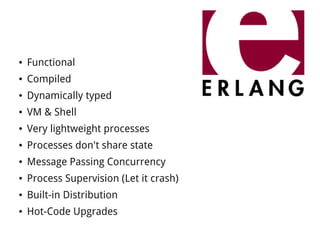
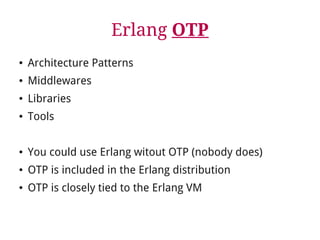
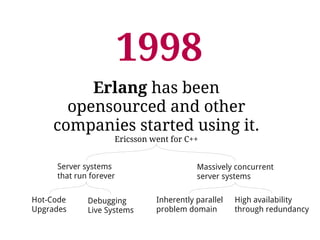



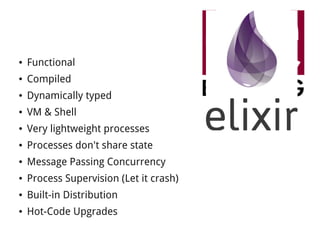



![My first Erlang Module
ŌŚÅ Module-Name == Filename.erl
ŌĆō e.g. my_first_module.erl
-module(my_first_module).
-export([my_first_function/1]).
% this is a comment for my first function
% this is another line of the comment
my_first_function(Param) ->
io:format(ŌĆ£wow my first function got called with param: ~p~nŌĆØ, [Param]).
1. Compile with erlc my_first_module.erl
2. Start Erlang shell with: erl
3. Call function my_first_module:my_first_function(ŌĆ£hello worldŌĆØ).](https://image.slidesharecdn.com/webileaerlang-141209073949-conversion-gate02/85/Introduction-to-Erlang-Elixir-at-a-Webilea-Hands-On-Session-14-320.jpg)
![My first Erlang Process
-module(my_first_module).
-export([my_first_function/0,
start_my_first_process/0]).
my_first_function() ->
receive
Msg ->
io:format(ŌĆ£wow my first process got a msg: ~p~nŌĆØ, [Msg])
end.
start_my_first_process() ->
spawn(?MODULE, my_first_function, []).
1. Compile with erlc my_first_module.erl
or if you are inside the shell with:
c(my_first_module).
l(my_first_module).
2. Start your first process:
Pid = my_first_module:start_my_first_process().
3. Send your first message:
Pid ! yeah_this_is_my_first_message.
4. How can you reuse the Process???](https://image.slidesharecdn.com/webileaerlang-141209073949-conversion-gate02/85/Introduction-to-Erlang-Elixir-at-a-Webilea-Hands-On-Session-15-320.jpg)
![Let it Crash
-module(my_first_module).
-export([my_first_function/0,
start_my_first_process/0]).
my_first_function() ->
receive
Msg ->
dispatch_my_msg(Msg),
my_first_function() %% yay, recursion!
end.
start_my_first_process() ->
spawn(?MODULE, my_first_function, []).
dispatch_my_msg({hello, world}) ->
io:format(ŌĆ£what a great hello world~nŌĆØ);
dispatch_my_msg({A, B}) ->
io:format(ŌĆ£tuple with ~p and ~p~nŌĆØ, [A,B]).
1. kinda stupid dispatcher, right???](https://image.slidesharecdn.com/webileaerlang-141209073949-conversion-gate02/85/Introduction-to-Erlang-Elixir-at-a-Webilea-Hands-On-Session-16-320.jpg)
![Let it Crash
-module(my_first_module).
-export([my_first_function/0,
start_my_first_monitored_process/1,
my_monitor/1]).
my_first_function() ->
receive
Msg ->
dispatch_my_msg(Msg),
my_first_function()
end.
my_monitor(ProcName) when is_atom(ProcName) ->
Pid = spawn(?MODULE, my_first_function, []),
true = register(ProcName, Pid),
MonitorRef = monitor(process, Pid),
receive
{'DOWN', MonitorRef, _Type, Pid, _Info} ->
my_monitor(ProcName);
stop ->
demonitor(MonitorRef)
end.
start_my_first_monitored_process(ProcName) ->
spawn(?MODULE, my_monitor, [ProcName]).
...](https://image.slidesharecdn.com/webileaerlang-141209073949-conversion-gate02/85/Introduction-to-Erlang-Elixir-at-a-Webilea-Hands-On-Session-17-320.jpg)
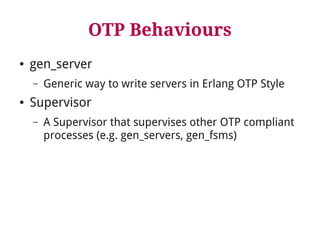
![gen_server
-module(sample_gen_server).
-behaviour(gen_server).
-export([start_link/0]).
%% gen_server callbacks
-export([init/1,
handle_call/3,
handle_cast/2,
handle_info/2,
terminate/2,
code_change/3]).
%%% API
start_link() ->
gen_server:start_link(?MODULE, [], []).
%%% gen_server callbacks
init([]) ->
{ok, []}.
handle_call(_Request, _From, State) ->
Reply = ok,
{reply, Reply, State}.
handle_cast(_Msg, State) ->
{noreply, State}.
handle_info(_Info, State) ->
{noreply, State}.
terminate(_Reason, _State) ->
ok.
code_change(_OldVsn, State, _Extra) ->
{ok, State}.](https://image.slidesharecdn.com/webileaerlang-141209073949-conversion-gate02/85/Introduction-to-Erlang-Elixir-at-a-Webilea-Hands-On-Session-19-320.jpg)
![supervisor -module(sample_supervisor).
-behaviour(supervisor).
-export([start_link/0]).
%% Supervisor callbacks
-export([init/1]).
%% ===================================================================
%% API functions
%% ===================================================================
start_link() ->
supervisor:start_link({local, ?MODULE}, ?MODULE, []).
%% ===================================================================
%% Supervisor callbacks
%% ===================================================================
init([]) ->
{ok, { {one_for_one, 5, 10}, [ %% 5 restarts within 10 seconds are allowed
{sample_gen_server, {
sample_gen_server, start_link, []
}, permanent, 5000, worker, [sample_gen_server]}
]}}.](https://image.slidesharecdn.com/webileaerlang-141209073949-conversion-gate02/85/Introduction-to-Erlang-Elixir-at-a-Webilea-Hands-On-Session-20-320.jpg)

